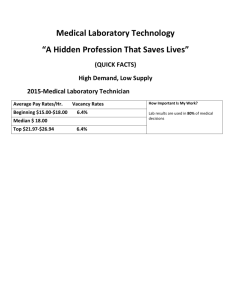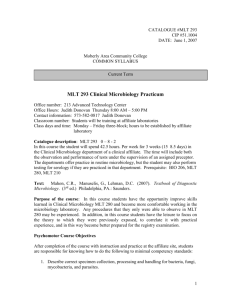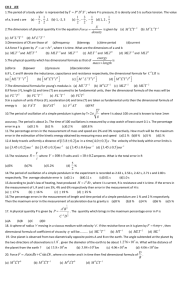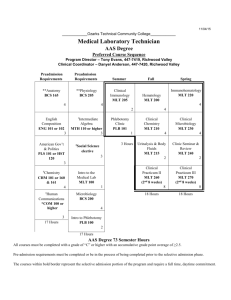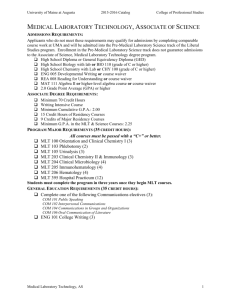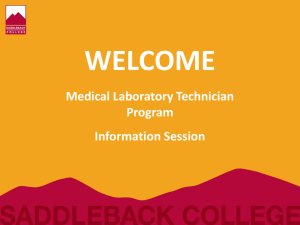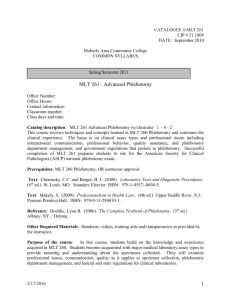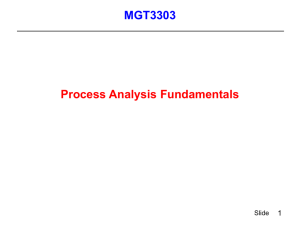MLT 292 Clinical Chemistry Practicum
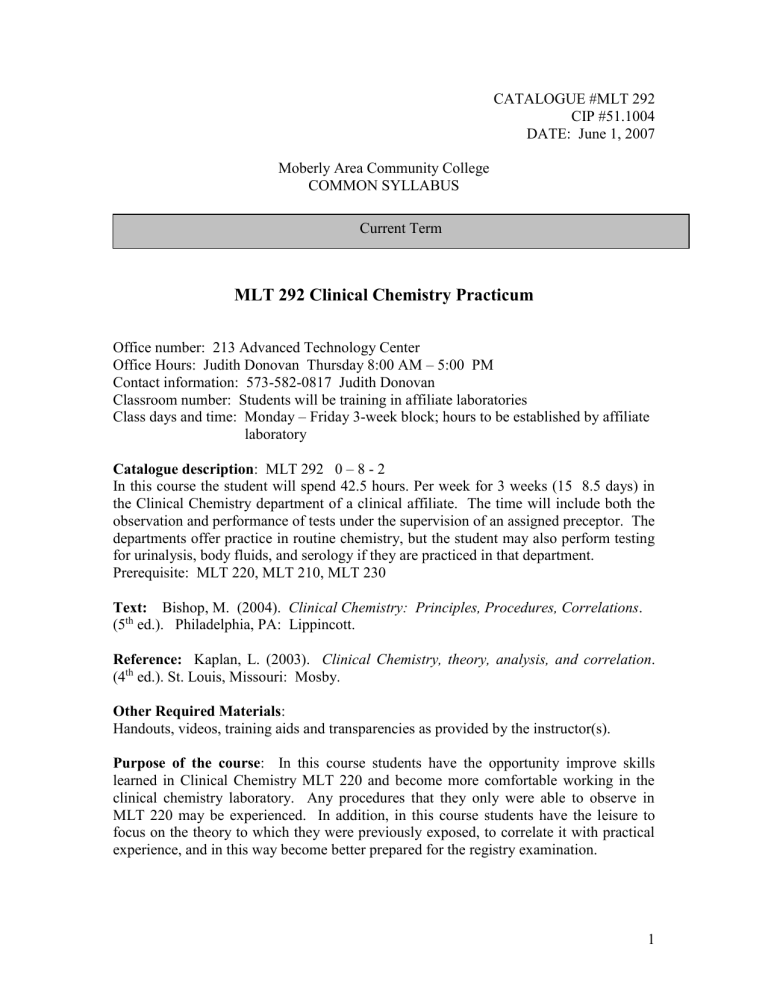
Moberly Area Community College
COMMON SYLLABUS
CATALOGUE #MLT 292
CIP #51.1004
DATE: June 1, 2007
Current Term
MLT 292 Clinical Chemistry Practicum
Office number: 213 Advanced Technology Center
Office Hours: Judith Donovan Thursday 8:00 AM – 5:00 PM
Contact information: 573-582-0817 Judith Donovan
Classroom number: Students will be training in affiliate laboratories
Class days and time: Monday – Friday 3-week block; hours to be established by affiliate
laboratory
Catalogue description : MLT 292 0 – 8 - 2
In this course the student will spend 42.5 hours. Per week for 3 weeks (15 8.5 days) in the Clinical Chemistry department of a clinical affiliate. The time will include both the observation and performance of tests under the supervision of an assigned preceptor. The departments offer practice in routine chemistry, but the student may also perform testing for urinalysis, body fluids, and serology if they are practiced in that department.
Prerequisite: MLT 220, MLT 210, MLT 230
Text: Bishop, M. (2004). Clinical Chemistry: Principles, Procedures, Correlations .
(5 th
ed.). Philadelphia, PA: Lippincott.
Reference: Kaplan, L. (2003). Clinical Chemistry, theory, analysis, and correlation .
(4 th
ed.). St. Louis, Missouri: Mosby.
Other Required Materials :
Handouts, videos, training aids and transparencies as provided by the instructor(s).
Purpose of the course : In this course students have the opportunity improve skills learned in Clinical Chemistry MLT 220 and become more comfortable working in the clinical chemistry laboratory. Any procedures that they only were able to observe in
MLT 220 may be experienced. In addition, in this course students have the leisure to focus on the theory to which they were previously exposed, to correlate it with practical experience, and in this way become better prepared for the registry examination.
1
Psychomotor Course Objectives
After completion of the course with instruction and practice at the affiliate site, students are responsible for knowing how to do the following to minimal competency standards:
1.
Describe correct specimen collection for specified chemistry determinations and correctly process specimens for testing.
2.
Evaluate specimen quality and describe corrective action to solve problems with it.
3.
Follow laboratory policies for record keeping and reporting.
4.
Follow written procedures.
5.
Safely handle and dispose of infectious materials, chemicals, and reagents.
6.
Participate in quality control and maintenance practices, evaluate performance, initiate action if quality control fails.
7.
Operate general automated chemistry instrumentation under supervision.
8.
Operate automated immunoassay instrumentation under supervision.
9.
Perform osmometry under supervision.
10.
Demonstrate knowledge of blood gas analysis.
Affective Course Objectives
At the end of the course the student will be able to display for following behaviors and attitudes:
1.
Perform chemistry tests with good technique, operate equipment reliably, and generate quality results.
2.
Demonstrate responsibility toward patients and colleagues.
3.
Maintain confidentiality.
4.
Accept instruction and constructive criticism.
5.
Demonstrate initiative and resourcefulness.
6.
Exhibit the ability to work independently.
7.
Demonstrate attention to detail and quality.
8.
Effectively communicate with patients and coworkers.
Course Content : This is a practicum course that is intended to be an opportunity to review, hone skills, and perform tests that they were unable to experience in MLT 220.
Students will use the course outline, lecture notes, textbook, checklist, and topic list from
Clinical Chemistry 220.
Assessment of Student Learning :
The student must achieve 78% or greater from performance on the skills checklist, any practical assessments or clinical activities, and the professional behaviors evaluation.
Failure to achieve this minimum score will result in dismissal from the program
2
The following grading scale applies to all programs within the Allied Health Division:
100 – 92% = A
83 – 91% = B
78 – 82% = C
66 – 77% = D
65% and below = F
Grading/Student Course Assessment
1.
Skills Checklist: Passing is 78% of the total points available
2.
Laboratory assessments, write-ups, and/or activities: Passing is 78% of the total points available.
3.
Professional Behaviors Evaluation: 78% of the total points used
Final clinical grade is the average of the Skills Checklist, laboratory assessments and activities, and the Professional Behaviors Evaluation.
Statement to Connect Course with General Education Outcomes or Technical
Program Outcome Statement: In compliance with MACC’S General Education outcomes, the student who successfully completes this course will be able to:
1.
Demonstrate effective written and oral communication skills.
2.
Demonstrate an understanding of scientific principles and computational skills and how to use them to solve problems and make informed decisions.
Program Outcomes and Assessments :
The Allied Health Department continually strives to meet the needs of the Medical
Laboratory Technician student through program improvements. This is a cooperative effort that includes input from the faculty, student, Medical Laboratory Technician
Advisory Board, and other appropriate agencies or entities. Students are assessed on mastery of the course concepts and essential skills throughout the courses of the Medical
Laboratory Technician Program. Other program assessments include clinical performance criteria, essential skills mastery, the clinical process evaluation, ASCP examination scores, placement rates, and follow-up surveys.
Instructor Policies/Expectations :
Instructors of this program expect the following from students:
1.
Come to clinicals prepared to discuss or apply important concepts by having read the assigned material or reviewed materials for instrument operation.
2.
Perform in clinicals by listening, taking notes if necessary, and taking initiative in learning skills.
3.
Consult with faculty for clarification of difficult material or additional resources to consult.
4.
Respect the learning environment by averting distractions and disturbances such as ringing cell phones and extraneous conversation in class.
5.
Treat instructors and fellow students with consideration, concern, and fairness.
3
Academic Dishonesty: MACC board policy is as follows: “Academic dishonesty by students damages institutional credibility and unfairly jeopardizes honest students; therefore, it will not be tolerated in any form.” Forms of academic dishonesty include but are not limited to the following: violations of copyright law, plagiarism, fabrication, cheating, collusion, and other academic misconduct. Incidents of dishonesty regarding assignments, examinations, classroom/laboratory activities, and/or the submission of misleading or false information to the College will be treated seriously. The procedure for handling academic dishonesty is outlined in the Student Handbook ( Policy Handbook
M.010
). In cases of alleged academic dishonesty, the burden of proof is on the student, not on the instructor.
Attendance:
Students are expected to prepare for and attend all clinical practice days. Regular attendance improves probability for acquisition of skills and success in the program.
Habitual tardiness and frequent absences are disruptive. Instructors carefully plan learning experiences, so it is important as a matter of courtesy and fairness to the affiliate that individuals be present. Students absent for reasons beyond their control, such as verified personal illness or family illness and/or death, can make up class work. If a student misses so many clinic days due to extenuating circumstances that the instructor feels the student cannot catch up, the MLT Program Coordinator will send a written report to the Director of Allied Health.
When a student misses twenty percent (20%) of clinical practicum and the instructors believe that students cannot complete the work within the scheduled time, a clinical grade of “Incomplete” will be issued until the clinical objectives/experiences have been successfully met. The student will complete the clinical practicum at his or her own expense. A letter to the Director of Allied Health will outline the extent of clinical absences and the schedule for clinical completion as agreed upon by both student and instructor. Upon approval by the Director of Allied Health, the student and instructor will implement the make-up clinical plan and provide documentation of completion to the
Director.
Tardiness, make-up, and late work: Tardiness to class and clinicals is disruptive and inconsiderate of others. Being on time is mandatory.
Make-up and late work: See the MLT Student Handbook for guidelines. Remember that communication, accountability and responsibility are very important professional behaviors.
Refer to the MLT handbook for the following policies:
Drop policy
Drug/alcohol policy
Grade appeal procedure
Student code of conduct
Student due process and grievance procedure
Student rights and privacy act
4
Use of computing resources
ADA Statement
Students who have disabilities that qualify under the Americans with
Disabilities Act may register for assistance through the Office of Access and ADA Services. Students are invited to contact the Access Office to confidentially discuss disability information, academic accommodations, appropriate documentation and procedures. For more information, please call either the Moberly office at (660) 263-4100 x 11240 or the Columbia office at (573) 234-1067 x 12120, or visit our web page at http://www.macc.edu/index.php/services/access-office .
5
